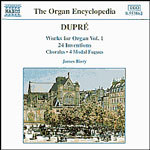
Works for organ Vol 1
 $25.00
Out of Stock
$25.00
Out of Stock6+ weeks add to cart
MARCEL DUPRE
Works for organ Vol 1
James Biery (organ)
[ Naxos Organ Encyclopedia / CD ]
Release Date: Saturday 1 May 2004
This item is currently out of stock. It may take 6 or more weeks to obtain from when you place your order as this is a specialist product.
"A rewarding issue "
- Penguin Guide
Marcel Dupre (1886-1971) was active as concert organist, composer, and master teacher throughout a long and distinguished career. At several times in his life, Dupre wrote sets of pieces for students of the organ, much as J. S. Bach had done more than two centuries earlier. Not only do these pedagogical works serve as vehicles for developing organ technique, they also demonstrate novel ways of composing music for the instrument.
The 79 Chorales, Op. 28, were written in the summer of 1930 while Dupre was enjoying the beach in Biarritz. The pieces were composed for organ students to use as a stepping-stone to the chorale preludes of Bach, since those works are frequently too difficult for the beginner. Although the 79 brief chorale settings are arranged in alphabetical order, Dupre included a list in order of difficulty for the student and teacher to follow.
Somewhat more substantive than the Op. 28 chorales, at least in terms of duration, are the two Op. 59 Chorale Preludes. Composed in 1962-63, they were undoubtedly intended for practical use in the church service.
At the age of 68 Dupre was named Director of the Paris Conservatoire, a post he held for only two years until mandatory retirement. During this time he was again drawn to pedagogical organ composition, resulting in the 24 Inventions, Op. 50. Dupre adopted the term "invention" from Bach and other earlier composers who used the title for brief pieces which display inventiveness of compositional technique. J. S. Bach's miniature keyboard masterpieces in two- and three-part counterpoint were intended as examples to teach the student "not alone to have good inventions (ideas), but to develop the same well." Similarly, the Dupre Inventions are based on unusual and surprising melodic ideas. Most are developed contrapuntally, with the musical lines imitating one another. Dupre also follows Bach's example (The We/I-Tempered Clavier) by writing pieces in all of the major and minor keys. A wide variety of moods are explored: serious (nos. 2, 4, 16), mystical (nos. 7, 11, 15, 22), playful and humorous (nos. 3 and 13), virtuosic (nos. 6 and 12), even heroic (no.18). Many of the pieces are composed in trio form, using different sounds for the two hands and a third for the feet. Among the sounds employed are flutes in various combinations (nos. l, 7, 11, 17), foundation stops (nos. 2, 4), solo reed voices (nos. 3, 10, 24), mutation stops (nos. 5,9, 13, 20, 23), sparkling mixtures (no. 12), strings (no.15), and occasionally a principal chorus sound (no.6 and 18). Nos. 11 and 23 make use of the sonority possible when two voices are sounded simultaneously in the pedals
Tracks:
24 Inventions for Organ, Op. 50, Nos. 1-12
6 Chorales, Op. 28
4 Modal Fugues, Op. 63
2 Chorales, Op. 59
24 Inventions for Organ, Op. 50, Nos. 13-24
